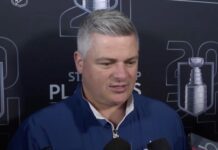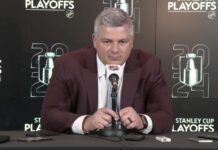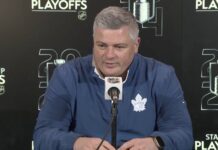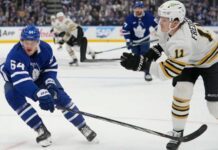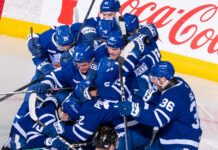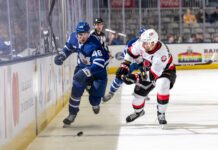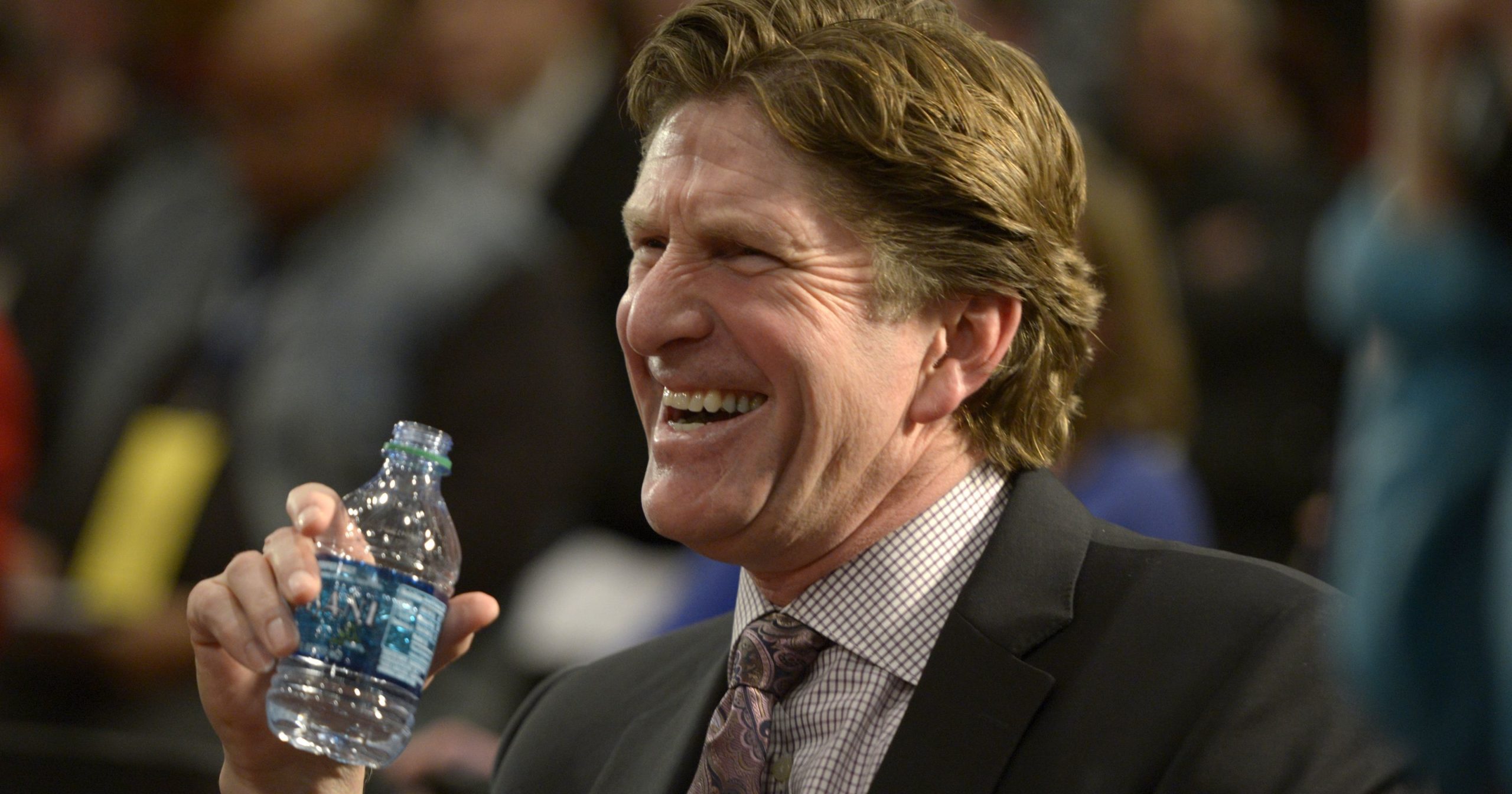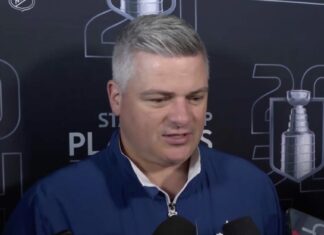Mike Babcock joined Bob McCown and John Shannon on Prime Time Sports on Wednesday evening for a wide-ranging interview on the state of the team, Frederik Andersen, the team’s veterans, and all of the young talent on the Leaf roster.
This is the first kind of whooping that you’ve taken this year. What’s different on the day after the team doesn’t play well as opposed to, arguably, the first five games, in which they gave up leads but overall were pretty good?
Mike Babcock: What I would tell you is I really liked us until last night. And I even liked lots of things about last night, to be honest with you. But I couldn’t believe how rattled we got. We gave up two goals early. We made mistakes watching the puck and chasing the puck that we haven’t been making. Part of it is the intent. I remember the start of last year, when I coached my first couple of nights here, I couldn’t believe what the guys felt in the building – the heat they felt. We haven’t felt anything like that this year because we think we’re a good team. Last night, when it came unraveled quick for us – and obviously, we’re playing a real good team too, so you’ve got to give them a little respect – I didn’t think we managed that very good. In the end, obviously, today for our group — because we feel like we’re going in the right direction – today we were going the opposite direction. I think that’s a lot like life. You’ve got to pick yourself up and get at her.
When you talk about heat, do you think that Freddie felt that heat as well?
Babcock: It’s been interesting with Freddie. Even today, six games into what we’re doing, I’m totally… He’s our guy. He’s big. He knows how to play. His track record is straight forward. He’s struggled. Why is that? Is it because he’s come to a new place? Is it because he signed a long-term deal? Is it because of the expectation of where you’re at? Is it because he was injured? I don’t know any of the answers, but I do know this. He’s got my support 100%. We’ve talked about it today. I haven’t done a lot of talking to him prior, besides, ‘hey, how are you doing? How’s life?’ that kind of thing. We had a good conversation. He knows he has the support of the guys and the support of us. He knows he’s a talented, big man and he’ll get his game back.
Don’t you think goaltenders, more than anyone else, can get snakebit? In other words, if it starts to go badly, or conversely if it starts to go well, you can ride that rail for a period of time? Everyday – forwards, defencemen – much less so. Or am I not seeing something?
Babcock: I believe that a bad goalie can have a hot run. I really believe that. We’ve seen it happen over and over again in the National league. You cannot have the numbers this guy had three straight years in a row. It’s impossible. You can’t get lucky that much. The other thing I’d say to you is that really good people, at whatever they do in their heart and their mind, know that they’re that good and they’ll get back to their consistent level. I really believe that, just because they know themselves and they trust themselves. Now, do we all experience some ups and downs we don’t expect and we all think it’s going to turn around sometimes quicker than it does, or — at one point in a bad streak — you say, ‘is this ever going to turn around?’ I think so. That’s momentary doubt for even the strongest people, but most of us push through it.
You coached in Anaheim just as Freddie played in Anaheim. Obviously, you were in Detroit, but there has to be a little bit of a difference in the culture of Toronto for even a goaltender?
Babcock: Great point. I had that same conversation today. I said exactly that. I said, ‘Freddie was in Anaheim. We lost in Game 7 of the Stanley Cup Final. It’s only been more exciting and more loved one time in Anaheim than that – the year they won the Cup.’ I said, ‘you couldn’t compare that to Detroit.’ I said, ‘in those ten years in Detroit, we had a run there. We had won more regular season and more playoff games than anyone in those ten years. We had an unbelievable run. The excitement was great. It still doesn’t compare to here. What I want you to understand about Toronto is it’s the hockey mecca in the world, it’s the greatest fans, it’s the greatest media coverage, and – contrary to what a lot of people think – they’re dying for you to be great. They’re not trying to catch you failing. They’re not at all. The media wants you to be fantastic.’ Everybody wants Toronto to be good. Maybe some teams outside don’t, but the National Hockey League needs Toronto be great, too, and we need Freddie to be good. He knows that. We spoke about that exactly. Is it different at the start? Sure, but it’s better than you could ever hope for.
You suddenly find yourself with two, three, maybe more players that have significant offensive skills. There is no expectation that these kids are going to score 40 or 50 goals – maybe they will – but there is no expectation of that; there’s no pressure to do that. We think, eventually, they have the chance to be those kind of guys. I wonder, as a coach, how flexible you are as a coach, in your teaching methods and philosophy, of how to play. Do you have to adjust to the talent you have, or do you have a regimen and you want everybody to be the square peg in the square hole?
Babcock: No, no, no. You have really elite players and they’re allowed to do different things at different times than other people because they can. They make decisions at the offensive blueline that other guys can’t because they can’t. In saying all that, they all have to know the score and the time, because that’s boss. Period. There’s a team time of your career and an individual time of your career. The individual time of your career is right at the start. You’re trying to make the team. You’re trying to become what you’re capable of becoming. These guys are all high-end players, though. They want to win. You think Auston Matthews or William Nylander or Mitch Marner like getting tattooed at home last night? They don’t. They don’t like turning the puck over and they don’t like being poor defensively and they don’t like making mistakes. None of them do. They want to be very good. We have a group of young guys like that. Today is a lesson, and I’ll tell you sometimes – no, not sometimes; probably most of the time – those lessons are better learned when things go bad than when things go good. That stung last night, anyway you look at it. We expected to come in and we wanted to push them. We thought we were capable of doing it, and we didn’t. They made us look bad.
Usually, high-end young players come into the league as solo acts. In other words, they’re not really surrounded by other high-end young players. They have guys that may come in with them that have a different skillset. They may go to a team that has one or two very good offensive players. But you’re in this unique situation where this little group of very highly skilled offensive players is coming into together. Tell me what you perceive to be the advantages and/or disadvantages of that happening. It doesn’t happen very often.
Babcock: I think they’re really lucky. The whole crew of young guys – everyone is focused on three of them, but to me Brown and Hyman are a special plus to the group because of their drive train, because of their work ethic, because of their work habits. They’re part of that group as well. You can include Carrick and Zaitsev in that group as well. Even Morgan Rielly is just as a kid, for crying out loud. There is a whole bunch of kids to hang out with and grow up with. They look at each other and they know they’re not going anywhere for ten years. They’re going to make this their home. The other thing is they look around the room and they say, ‘we’re going to be good.’ That’s a special feeling in itself.
I don’t know who was talking before I got on. You were talking about Nylander, and he’s better than you expected. He’s way better than I expected. Even today in practice, when he learns to compete everyday…. His edges; he’s an unbelievable skater. His turn backs and his power game down low… He’s been more of a rush player and a skill player, but as he evolves and becomes a heavy player – because his edges are so good – he’s special to watch. Now, they’re all unique in their own way, but he has a chance. You put the shot in there with it, and I think he has a chance to be a real good player.
But he’s changed even in that small group of games he played for you last season.
Babcock: They’re ever evolving. They don’t know what they are. We don’t know what they are. We’re trying to figure it out together. I think he’s doing a really nice job of trying to be more competitive and have the puck more often. What these guys are all figuring out fast is that, in the league, they don’t give you the puck back. You better learn to check real good or you never have the puck.
That said, you got rid of a veteran yesterday. Why can’t Milan Michalek play on this team?
Babcock: He can play on this team, but we just felt that we’re going to give Brown more of an opportunity because he gave Leo Komarov and Kadri more pace. Last year, we really liked those guys when they played with Soshnikov or played with Grabner. They had the puck more and were on the forecheck more. When you looked at even last night in the game, and it might not be apparent because of the score, but those guys were in the offensive zone suddenly again and had the puck way more. They need someone with pace on their line. I’m not saying he can’t [play]. In our situation right now in Toronto, we have Greening, Laich and him all in the same situation. We can use him.
We’ve talked a bit about Nylander. Everybody knows about Matthews, and they’re the top two scorers on your team. The other young man, Marner, is a kid that John and I watched a lot of last year in London and through the Memorial Cup. I, for one, said he really is an impressive player and I think he was flying below the radar a little bit. Tell me what you’ve seen in him and what you like about him.
Babcock: He might’ve made the most plays so far of anybody. He works. That’s what I like. He competes every single shift. He’s good offensively. He’s good defensively. He’s right there leading the team in blocked shots, if you can believe that. I didn’t think he was as good last night as he has been, but every night he makes three or four plays that send in Bozak or van Riemsdyk past a D-man for a clear cut [breakaway]. He could easily have a tonne of points. It hasn’t happened for him. I don’t think that’s the end of the world right now. He’s another guy who I didn’t know – I mean, I knew he was a star; you can’t do what he did last year in junior hockey and not be a star that way – but I didn’t know if his size was going to be a real issue for him and affect him so much. It’s obviously not. He doesn’t get touched. He’s way stronger on the puck than you expect. He can drive the line as a winger. Most wingers can’t drive a line. He has the ability to do such.
In talking to a few teams around the NHL, everybody seems to be happy with their young players and frustrated with their veterans. I’m not trying to put words in your mouth, Mike, but there seems to be a real level of enthusiasm for young players, and even veteran players in leadership roles haven’t responded. How would you describe what your veterans have done for this team?
Babcock: It’s interesting to me. We haven’t won any games basically, and I’ve been impressed with lots of our guys – I really have — and how they played and how they’ve looked. I think Bozak has had six of his best games since I’ve been here, with and without the puck. I think he’s tried to be a real good man. I didn’t think Leo and Naz were good in game one; I thought they really responded in game two. With the exception of the Chicago game, I haven’t minded those guys as well. I thought they’ve played pretty good for us. Up front, I think that’s been positive. On the back, I measure our group a lot in scoring chances we give up. I think we’ve done a nice job of that. Last night, like we already talked about, we’d like to have back. We made some poor decisions. We let guys be in home free with our goaltender. That I didn’t like. All in all, there has been lots of positive things. We’re excited about our group. Are we excited today? Today is a tougher day, but we put in the work here today and we’re getting ready for a good Florida team tomorrow. We’re excited to bounce back so we can feel good about ourselves and talk in a positive manner.
Peter Chiarelli was on with us yesterday and I asked him about the number of goals and offensive chances and just the style of the game this early in the season. He agreed he thought it was there. His response was, “well, the 170 best players in the National Hockey League played in the World Cup, and it kind of put all of those really talented players a step or two ahead.” Do you subscribe to that theory, and are you seeing it behind the bench as a coach?
Babcock: I hadn’t thought about it like that. To be honest with you, I’m probably more hunkered down right here at home watching this group here than I am the whole league as much as I normally do. In saying that, people want goals. They want opportunities. That part is exciting. I think we’ve got a lot of great young players in the game. I don’t think, in the end, it’s going to be the team that plays the best offense that wins, because I don’t think it usually is. I think teams will really tighten things up, and obviously the goaltending gets better and better and better, and so does the penalty killing.


